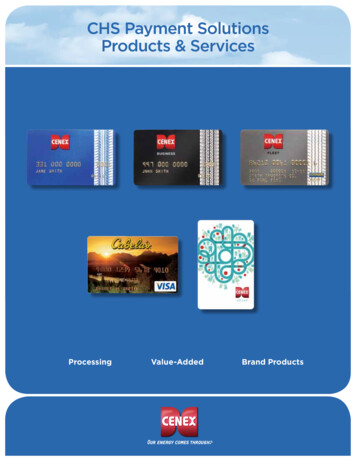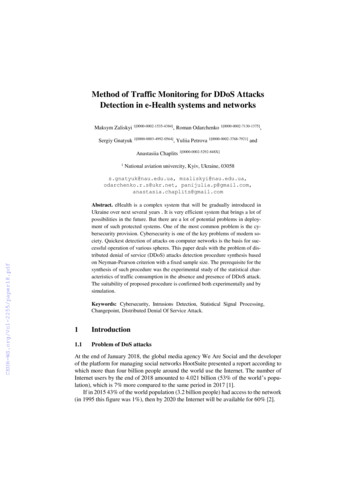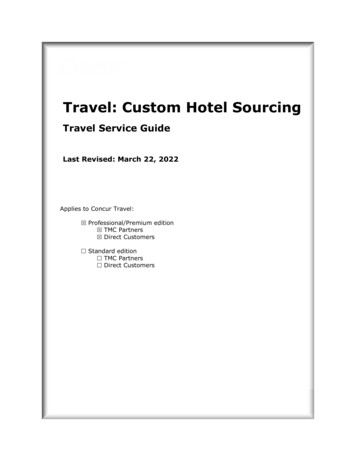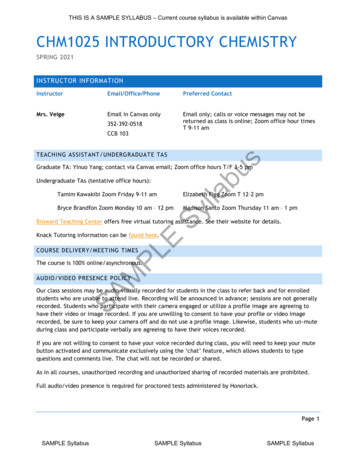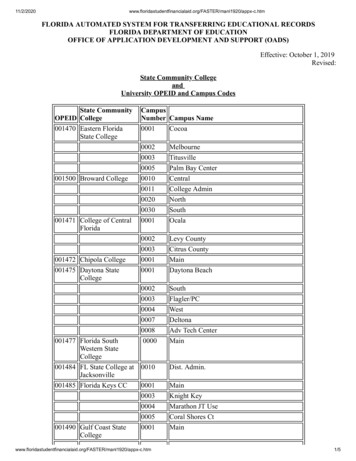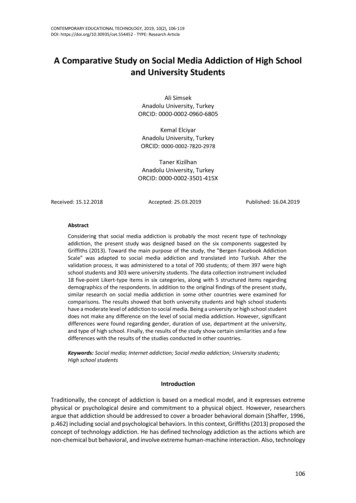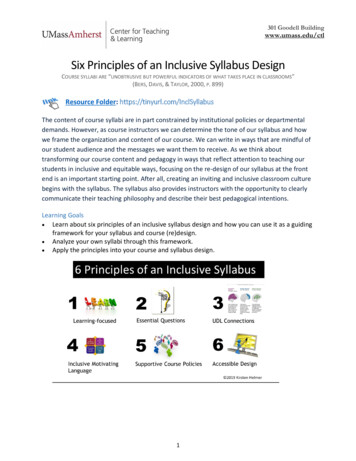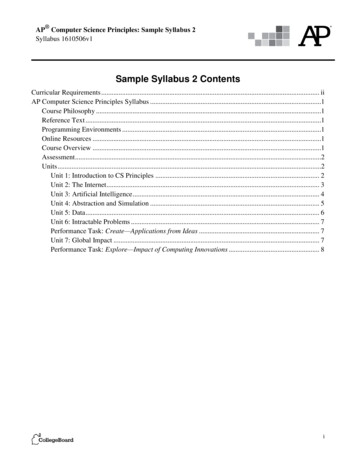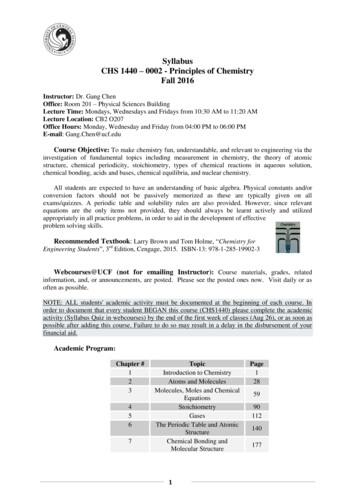
Transcription
SyllabusCHS 1440 – 0002 - Principles of ChemistryFall 2016Instructor: Dr. Gang ChenOffice: Room 201 – Physical Sciences BuildingLecture Time: Mondays, Wednesdays and Fridays from 10:30 AM to 11:20 AMLecture Location: CB2 O207Office Hours: Monday, Wednesday and Friday from 04:00 PM to 06:00 PME-mail: Gang.Chen@ucf.eduCourse Objective: To make chemistry fun, understandable, and relevant to engineering via theinvestigation of fundamental topics including measurement in chemistry, the theory of atomicstructure, chemical periodicity, stoichiometry, types of chemical reactions in aqueous solution,chemical bonding, acids and bases, chemical equilibria, and nuclear chemistry.All students are expected to have an understanding of basic algebra. Physical constants and/orconversion factors should not be passively memorized as these are typically given on allexams/quizzes. A periodic table and solubility rules are also provided. However, since relevantequations are the only items not provided, they should always be learnt actively and utilizedappropriately in all practice problems, in order to aid in the development of effectiveproblem solving skills.Recommended Textbook: Larry Brown and Tom Holme, “Chemistry forEngineering Students”, 3rd Edition, Cengage, 2015. ISBN-13: 978-1-285-19902-3Webcourses@UCF (not for emailing Instructor): Course materials, grades, relatedinformation, and, or announcements, are posted. Please see the posted ones now. Visit daily or asoften as possible.NOTE: ALL students' academic activity must be documented at the beginning of each course. Inorder to document that every student BEGAN this course (CHS1440) please complete the academicactivity (Syllabus Quiz in webcourses) by the end of the first week of classes (Aug 26), or as soon aspossible after adding this course. Failure to do so may result in a delay in the disbursement of yourfinancial aid.Academic Program:Chapter #1234567TopicIntroduction to ChemistryAtoms and MoleculesMolecules, Moles and ChemicalEquationsStoichiometryGasesThe Periodic Table and AtomicStructureChemical Bonding andMolecular Structure1Page1285990112140177
891011121314Molecules and MaterialsEnergy and ChemistryEntropy and the Second Law ofThermodynamicChemical KineticsChemical EquilibriumElectrochemistryNuclear Chemistry212247279302340380415Class Preparations: It is necessary to read and do the problems below to reinforceunderstanding of key principles & concepts, to help develop effective problem solving skills, and toprepare for the exams and quizzes.Chapter (please read .)Chapter 1: (1.1 – 1.5)Chapter 2: (2.1 – 2.10)Chapter 3: (3.1 – 3.6)Chapter 4: (4.1 – 4.5)Chapter 5: (5.1- 5.7)Chapter 6: (6.1 – 6.8)Chapter 7: (7.1 – 7.8)Chapter 8: (8.1 - 8.6)Chapter 9: (9.1 - 9.8)Chapter 10: (10.1 – 10.8)Chapter 11: (11.1 – 11.8)Chapter 12: (12.1-12.9)Chapter 13: (13.1 – 13.8)Chapter 14: (14.1 – 14.8)Problem # (odd nos)13-17; 21; 31; 33; 37; 41-69; 73; 75; 8511-17; 21-797 - 697 - 619 - 797 - 757 - 799; 15; 19; 23-27; 35; 39-61; 65 - 697 – 23; 29 - 697 – 15; 21 -7511 – 35; 39 – 45; 55; 63; 67- 779 – 39; 41-67; 71 - 835 – 35; 37 – 55; 57 – 63; 69 – 75; 79 - 917 - 79Exams and Quizzes: All exams will be given during regularly scheduled class time, whilequizzes will be given during discussion sessions. In-course exams will be 50 minutes each, final willlast 150 minutes. All exams and quizzes will be cumulative, mandatory, and computer-gradedmultiple choice format. Since the exam dates are given well in advance, there will be no make-upexams except in the case of illness. A written doctor’s exemption will be required and an oral makeup exam could be administrated. In the event that one or more exams are missed, your grade on thefinal exam will substitute one missing grade. The remaining missing grades will be computed aszeros. If you do not miss any exam, your grade on the final exam will replace the lowest grade amongthose in any of your previous exams. This rule is only valid when your grade on the final is higherthan the one to be replaced. Exams and quizzes questions will be taken from material covered inlecture, assigned reading, and suggested problems. Exams and quizzes will be computer graded. It isthe responsibility of the student to have a clean, flat, pink test form (Scantron) with UCF logo, and anumber 2 pencil for each exam and quiz.Note: Students without a valid UCF ID and the test form will notbe allowed to take the exam.Grading: The final grade (course grade) will be calculated based on the total percentage earned inexams quizzes.2
Test4 In-course Exams (25 ques/exam)Final Exam (60 questions; cumulative)QuizzesGrand TotalEach 15 %20 %20 %100 %Your grade will be calculated on the basis of a percentage of total points. There will be no curve andgrades will be assigned based on:90% - 100% A75% - 89% B60% - 74% C50% - 59% NC (no credit) 49% FCalculator Policy: Only basic and scientific calculators (without graphic functions) are allowed forall exams in class (e.g., TI-30XA). NO GRAPHING CALCULATORS ARE ALLOWED!!! Any use ofelectronic device (iPod, cell phone, MP3 player, computer ) during exams is strictly prohibited. Anyuse of such device will be considered an attempt to cheat on the exam and will result in a 0 on thegrade.Academic IntegrityAcademic integrity is at the center of the educational experience at UCF. Therefore students areexpected to uphold the highest standards of academic integrity and not engage in nor tolerateacademic dishonesty. Academic dishonesty includes, but is not limited to, fabrication, cheating orplagiarism. Any violation of academic integrity will be investigated and, where warranted, thestudent will receive appropriate sanctions through the University's Student Conduct Process. Pleasefamiliarize yourself with the current UCF Student Handbook. In particular, adherence to the StudentConduct Policy and Academic Integrity Policy will help to ensure that your learning and livingexperiences are founded on integrity.Classroom ConductDisruptive behavior is not tolerated. The instructor will consult with students consistently interruptingclassroom routine. Students are subject to removal from class permanently. Cell phones and pagersmust be on silent mode during class and tests. Laptop computers are allowed for note taking purposesonly. No audio or video recording is allowed without the instructor’s authorization.Accommodations for the differently-able studentsStudents with disabilities who qualify for academic accommodations must present a letter from theoffice of Students Accessibility Services (SAS) and discuss specific needs with the instructor,preferably within the first two weeks of class. The SAS determines accommodations based onappropriate documentation of disabilities (Ferrell Commons, Room 185, 407/823-2371).3
In the best interest of fulfilling the course objectives and assuring the academic integrity of theinstitution, the instructor reserves the right to modify/change any part of this schedule/syllabus ifwarranted!Recipe for Success in CHS 1440* Take responsibility for your education - There is a common myth among students thatbecause they pay tuition they deserve to receive credit for the class. Instructors are here to createa learning environment. Whether you learn depends on your willingness to listen, ask appropriatequestions, and do the work necessary to pass the course. If your academic preparation from highschool is weak or if you have been out of school for a period of time, you may have to workharder and seek more help in order to succeed.* Attend every class - You will find that students, who attend every class, listen to theinstructor and take good notes will be more likely to pass with a higher grade. If you have anemergency or illness, contact your instructor ahead of time to let her/him know that you will beabsent. A local study showed that students who missed the first class meeting were more likelylater to withdraw or fail. Important note: if you miss a class it is your responsibility to meet withthe instructor, outside of regular class time, to determine a plan to make up the missed work.* Do not lobby/negotiate for a grade!* Understanding - the various concepts are vital to learn chemistry. Memorizing is a recipe fordisaster!* Review lecture material early and often - Do not wait until the last few minutes before a testto do the necessary revision.* Review the worked exercises/examples in the textbook - Also at the end of each chapter is alist of chapter goals. Those serve as helpful review tools. Find time to work on the suggested end-ofchapter problems. Practice makes perfection.* The instructor strongly encourages you to use office hours for discussing the materialcovered in classes and reviewing exams - Get assistance ASAP, if needed. Please make use ofthe Student Academic Resource Center (SARC); Howard Phillips Hall 113; www.sarc.sdes.ucf.edu.* When having academic difficulty seek assistance - Your instructor is always willing toassist you however, there are other ways to get help. The Student Academic Resource Center(SARC) has Peer Tutoring and SI Leaders - undergraduate students who have already taken andsucceeded in the course). The Department of Chemistry offers free one-on-one tutoring sessions witha chemistry graduate student at the Chem.4
TENTATIVE SCHEDULE – Fall 2016Lectures based on DaysAug 22- Sep 14Friday, Sep. 16Sep 19 - Oct 12Friday, Oct. 14Oct 17 – Nov 02Friday, Nov. 04Nov 07 – Nov 23Monday, Nov 28Dec 02Monday, Dec 12Holidays:Chapter 1: IntroductionChapter 2: Atoms and MoleculesChapter 3: Molecules, Moles & Chemical EquationChapter 4: StoichiometryExam 1Chapter 5: GasesChapter 6: Periodic Table and Atomic StructureChapter 7: Chemical Bonding and Molecular StructureChapter 8: Molecules and MaterialsExam 2Chapter 9: Energy and ChemistryChapter 10: Energy and the Second LawChapter 11: KineticsExam 3Chapter 12: Chemical EquilibriumChapter 13: ElectrochemistryChapter 14: Nuclear ChemistryExam 4Final Exam ReviewFinal Exam – Cumulative (10:00 am – 12:50 pm)Labor Day: Mon. September 05, 2016Veteran’s Day: Mon. November 11, 2016Thanksgiving: November 24 – 26, 2016Important dates during the Fall 2016 semester:oooooooooRegistration on myUCF: August 21, 2016Classes Begin: Monday, August 22, 2016Late Registration: Monday, August 22, 2016 – Friday, August 26, 2016Last Day of Full Refund: Thursday, August 25, 2016Payment Deadline: Friday, September 02, 2016Grade Forgiveness Deadline: Monday, October 31, 2016Withdrawal Deadline: Monday, October 31, 2016Classes End: Saturday, December 03, 2016Final Examination Period: Tuesday, December 06, 2016 - Monday, December 12, 2016(http://registrar.ucf.edu/exam/2016/fall)o Grades available in myUCF: Saturday, December 17, 2015INSTRUCTOR EXPECTATIONSThe following expectations are to enhance your ability to learn in this class, to avoid disruption anddistraction, and to improve the quality of the classroom experience. Repeated failure to meet theseexpectations may result in dismissal from the classroom and/or a lower grade for the course. Entering/Exiting Class:5
Please arrive on time to class and stay for the entire class period. Late arrivals and early departuresare disruptive. If despite your best effort you arrive late, please quietly take a seat at the back of the classroom.Similarly, in the rare event that you must leave class early (e.g. for a medical appointment), email mein advance to let me know, then sit close to the rear door and leave as unobtrusively as possible. Ifyou can’t be there on time or must always leave early because of a class or work conflict, either seekspecific permission from me or do not take the class. During exams, try to use the restroom before coming to class. Noise: When class begins, please stop your conversations. Wait until class is completely over before putting your materials away in your backpack, standingup, or talking to friends. Electronic Devices: No taping, filming, or photography in class without my prior permission (whether by camera, cellphone, or other means). These activities are distracting and inhibiting to faculty and other students,may infringe upon privacy or copyright, and have a chilling effect on classroom discussion. Cell phones should be turned off. No talking on cell phones, text messaging, or emailing on laptopsduring class. Wait until after class to return any calls received. No listening to iPods or other electronic recording devices during class. Email Etiquette: You are expected to write as you would in any professional correspondence. Email communicationshould be courteous and respectful in manner and tone. Do not send emails that are curt ordemanding. Do not expect an immediate response via email (normally, a response will be sent within twobusiness days). If your email question is sent at the last minute it may not be possible to send you aresponse before an assignment is due or a test is given. Do not post personal information about yourself or others about third parties to the class list server.For example, if you are having trouble with a lab partner you should see the instructor in person todiscuss the specifics of the issue. Classroom Etiquette: Please come to class appropriately dressed. You are expected to seat in a right position, i.e. each part of your body should be on the already predetermined part on your chair. Please treat the furniture and equipment in the classrooms and computer labs as if it were your own.Leave the classroom as you find it, turning off equipment as necessary and pushing in chairs. Throwany trash away on your way out. Do not place your feet on the top of the cushion of your seat or on the back of any of the chair in therow in front of you. Throw away your trash. Under no condition is smoking or other tobacco use (e-cigarettes) acceptable in the classroom. Participation:6
In the case participation is counted as part of your grade, missing class could negatively impact yourgrade. Disrupting class could also lower your participation grade. Keep on the topic at hand. If you have questions off the current topic, address these outside of classat office hours or by email with the TA or instructor. Do not talk out of turn. Wait to be recognized before speaking and do not try to dominate adiscussion with your questions or comments – give others a fair opportunity to participate. Common Courtesy: Please try to be pleasant and positive in your classroom behavior. Show respect for all class members, be polite to your instructor and classmates. Do not use “hey” toaddress others in the classroom, use instead Sir, Miss, Madame, Dr., Professor, etc. Do not interrupt another who is speaking. Others may have different ideas and opinions fromyours, they may ask questions you perceive to be “stupid,” but they deserve the same level ofrespect from you as you wish from them. Do not disturb others by engaging in disruptive behavior. Disruption interferes with the learningenvironment and impairs the ability of others to focus, participate, and engage. Food and drink are discouraged in class. There may be times that you need a beverage or smallsnack during class. Avoid bringing in large meals or food that is noisy when unpackaged or chewed. The standard class period (for Monday, Wednesday, Friday classes) at UCF is 50 minutes. Please donot start putting books away, closing up notebooks, and zipping up book-bags before the official endof class. This can be disruptive and distracting to both your classmates and the instructor.7
1 Syllabus CHS 1440 - 0002 - Principles of Chemistry Fall 2016 Instructor: Dr. Gang Chen Office: Room 201 - Physical Sciences Building Lecture Time: Mondays, Wednesdays and Fridays from 10:30 AM to 11:20 AM Lecture Location: CB2 O207 Office Hours: Monday, Wednesday and Friday from 04:00 PM to 06:00 PM E-mail: Gang.Chen@ucf.edu Course Objective: To make chemistry fun, understandable, and .
